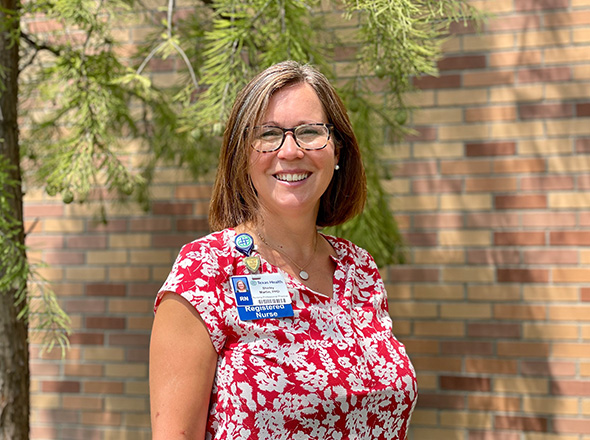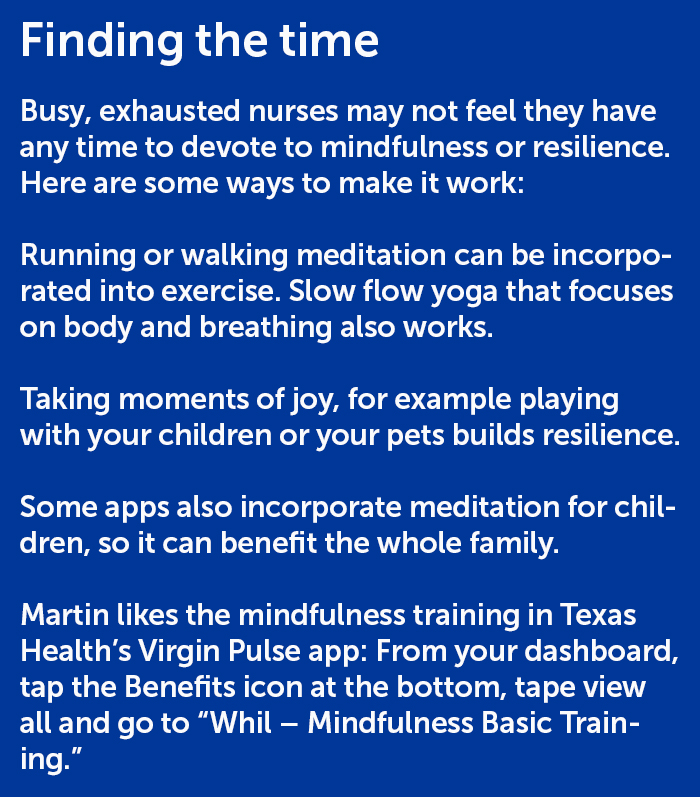Resilience can be strengthened with self-compassion and mindfulness practice, says Shirley Martin, PhD, R.N., CPN, Texas Health’s newest nurse scientist. This is especially important for nurses and caregivers now during the latest COVID-19 surge.
Even the barest minimum, like setting aside one minute a day to meditate, is a way to start.
A nurse since 1989, Martin came to Texas Health Presbyterian Hospital Dallas in late July. She has studied resilience since 2019 in nursing students at Texas Christian University and has published a study on the mental health effects of mindfulness in the Journal of Allied Health, with a second study under review for publication.
Self-compassion may not always come naturally to health professionals, she said.
“Generations of nurses always put the other person first and don’t take care of themselves,” Martin said. Especially during the pandemic, “they’re constantly dealing with intense suffering situations, giving, giving, giving and not taking the time to bounce back from that.”

Also, she said, “Caregivers have a natural empathetic response. Empathy can be a good thing, but it’s a double-edged sword — we’re actually feeling what someone else is feeling.”
The antidote, she said, is self-compassion: “I’ll hold you in your suffering, not take on your suffering.”
Learning to focus
Another key to resilience, she said, is using mindfulness to recognize how you feel in a situation.
“Sometimes just taking a moment to be mindful, to be aware of what we need to do in this moment, helps. Is this a crisis situation and I have to respond? Or is there a moment when I can just withdraw and take five minutes to cry?”
With practice, even something as simple as focusing on your feet as you move from room to room — called soles of the feet practice — can become a kind of break. “On the job and in the situation, your brain is working so hard while you’re moving from one room to the next room. Taking that time to keep your attention on your feet brings you back into your body.”
Practice can start small
Like anything else, mindfulness comes with practice.
She said a good place to start is by setting the intention to meditate one minute a day.
“Even a few minutes a day can make a difference,” she said. “A lot of people benefit from breath-focused meditation, not trying to control your breath, just noticing it. Or think about a time or a space where you felt safe, comforted and happy.”
Martin said she and Elizabeth Asturi, M.S.N., R.N., NE-BC, chief nursing officer at Texas Health Dallas, are actively talking about what can be done to help clinicians with resilience. A committee has been formed to help roll out some of the resources available to nurses.
“I know our courageous, dedicated nurses have and will always provide quality care no matter what the circumstances,” Asturi said. “But it’s our job to help give them as many skills as we can as the pandemic continues to add more and more pressure.”
Martin added, “I hope to be one of many people helping share knowledge about resiliency skills that nurses can use daily for coping, stress reduction and improved overall well-being.”


